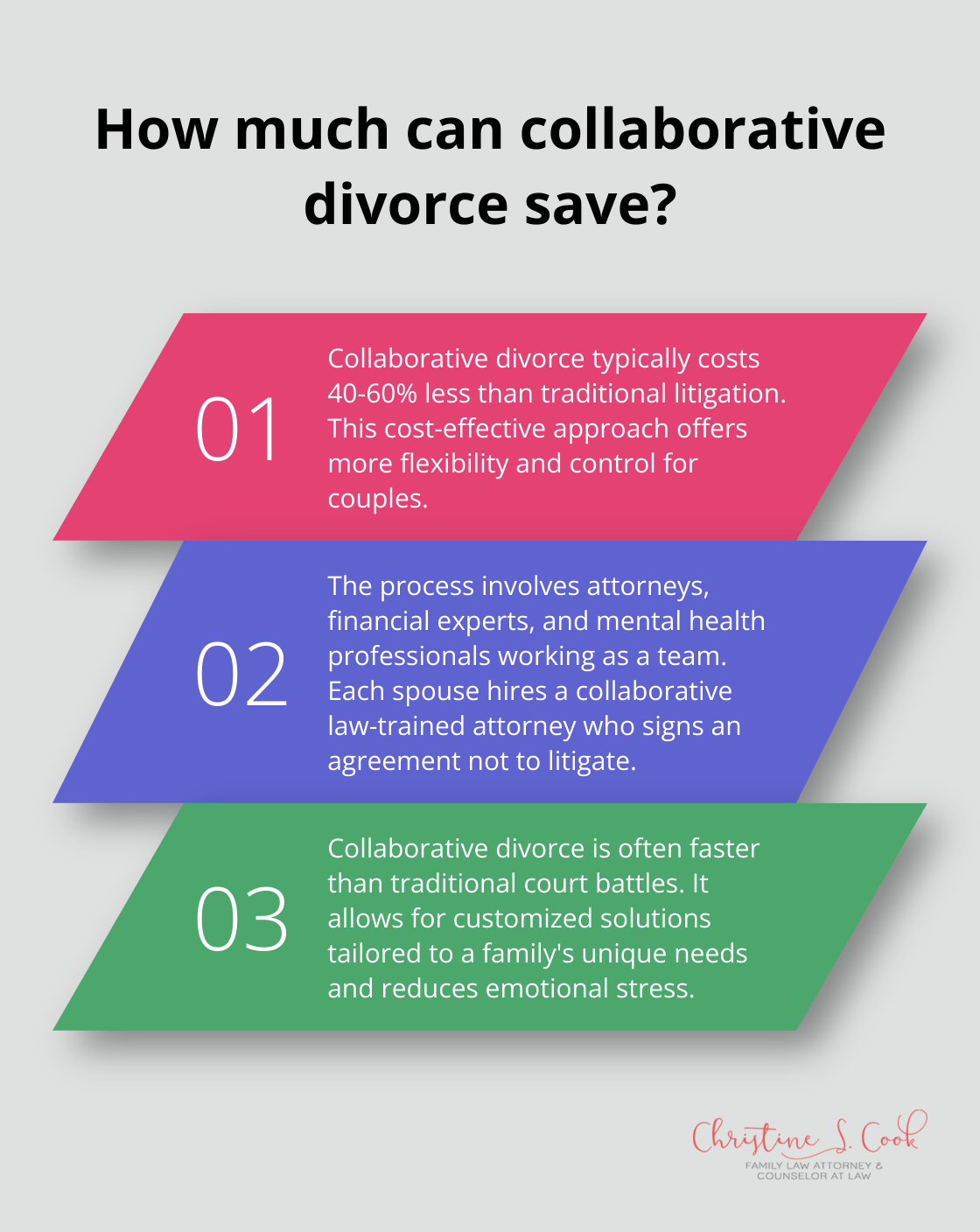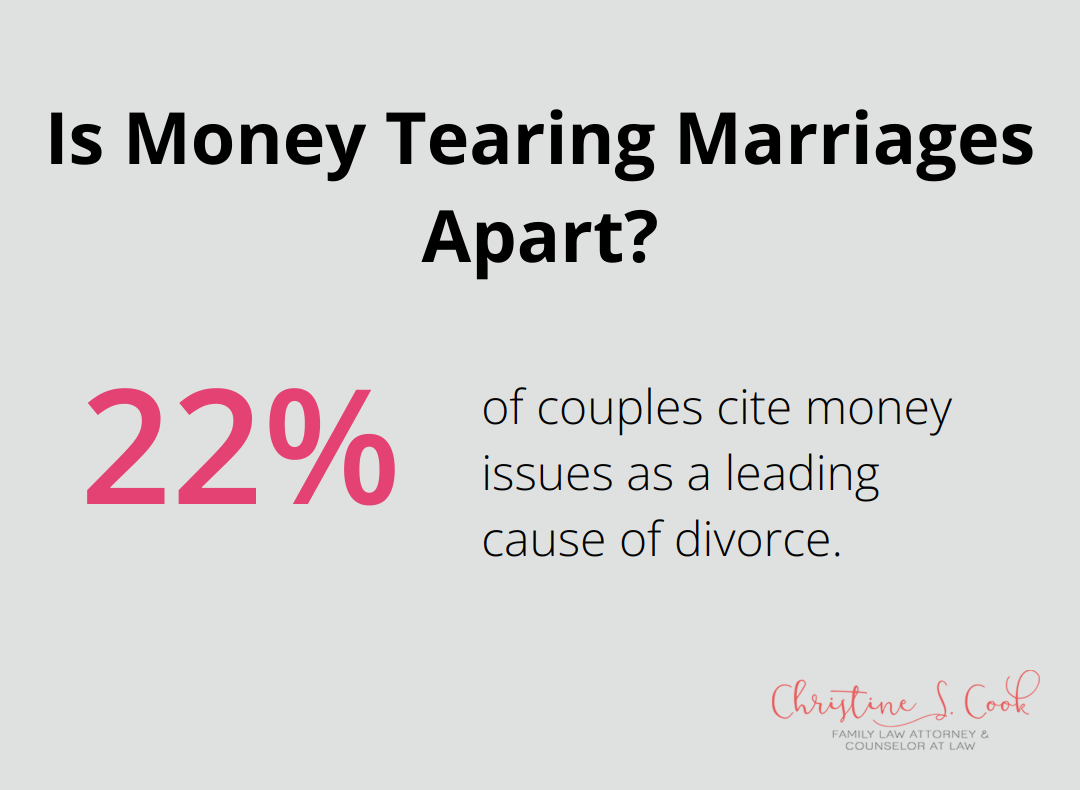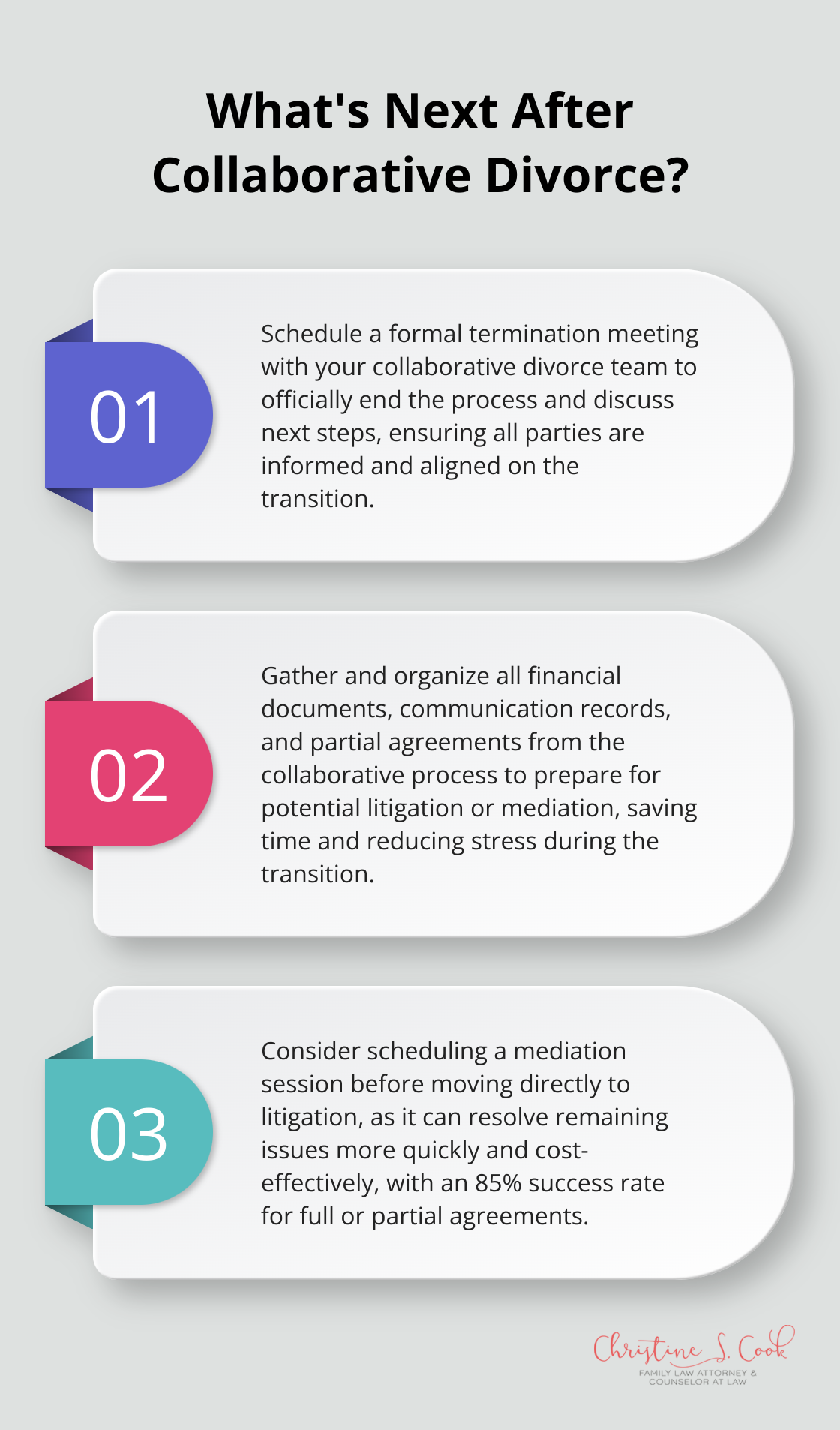Collaborative divorce offers couples a chance to end their marriage amicably. However, this process doesn’t always lead to a successful resolution.
At Christine Sue Cook, LLC, we’ve seen firsthand what happens when collaborative divorce fails. Understanding the potential pitfalls and knowing your options is crucial for anyone considering this approach.
Collaborative divorce represents a legal approach that offers more flexibility, control, and confidentiality compared to traditional litigation. This process involves each spouse hiring an attorney trained in collaborative law. These attorneys sign an agreement not to litigate, committing to find a mutually beneficial solution. If the process fails, both attorneys must withdraw, and the couple needs to hire new lawyers for court proceedings.
The collaborative divorce team typically includes:
Collaborative divorce offers several advantages over traditional litigation:
The collaborative process unfolds through a series of meetings. During these sessions, the team works together to:

This team approach often leads to more comprehensive and lasting agreements. It addresses legal, financial, and emotional aspects simultaneously, setting the stage for a healthier post-divorce life for all family members.
As we move forward, it’s important to understand that while collaborative divorce offers many benefits, it’s not without its challenges. Let’s explore what can happen when this process encounters difficulties.
Collaborative divorce, while often effective, can encounter significant hurdles. Several common reasons exist for the breakdown of this process.
One of the most frequent causes of collaborative divorce failure is financial dishonesty. Money issues are cited as a leading cause of divorce by 22% of couples. This lack of transparency can derail the collaborative process. When one spouse hides assets or provides incomplete financial information, it erodes trust and makes fair negotiations impossible.
Effective communication forms the cornerstone of successful collaborative divorce. However, many couples struggle with this aspect. Research suggests that premarital observed negative and positive communication nearly reached significance as predictors of divorce. These same issues often persist during the divorce process, which hinders productive negotiations and compromises the collaborative approach.
Divorce is inherently emotional, and unresolved feelings can sabotage even the best intentions. The Holmes-Rahe Stress Inventory ranks divorce as the second most stressful life event (second only to the death of a spouse). This emotional turmoil can manifest as anger, resentment, or an inability to compromise, all of which prove detrimental to the collaborative process.
Some couples enter collaborative divorce without fully understanding or committing to its principles. This lack of dedication can lead to:
In some marriages, one spouse may hold more power (financial, emotional, or otherwise). This imbalance can carry over into the collaborative process, making fair negotiations difficult. The less empowered spouse might feel pressured to accept unfavorable terms, which undermines the collaborative spirit.

When these challenges arise, it’s important to have experienced legal guidance. Attorneys trained in both collaborative and traditional divorce processes (such as those at Christine Sue Cook, LLC) can provide the necessary support, regardless of how a divorce unfolds. As we move forward, let’s explore what steps couples can take when collaborative divorce fails to meet their needs.
When collaborative divorce fails, couples must take swift action. The first step involves a formal termination of the collaborative agreement. One or both parties should provide written notice to their respective attorneys. Quick action prevents unnecessary costs and emotional strain.

If you and your spouse are unable to complete a collaborative divorce, you will need to file a petition for a contested divorce instead.
After the collaborative process ends, both spouses must hire new attorneys for potential litigation. Collaborative attorneys sign an agreement that prohibits them from representing their clients in court if collaboration fails.
When seeking new representation, couples should look for attorneys experienced in both collaborative and litigation processes. These lawyers will better understand the case history and can provide insights on transition strategies.
The shift to litigation requires thorough preparation. Couples should gather all financial documents, communication records, and any agreements reached during the collaborative process. While collaborative discussions generally remain confidential, certain information may still hold relevance in court.
Couples should prepare for a potentially longer timeline. The American Bar Association notes that litigated divorces can take anywhere from 9 months to several years to resolve (depending on case complexity and court backlogs).
Before proceeding directly to litigation, couples should consider mediation as an intermediate step. Mediation offers a structured environment for negotiation without the formality of court proceedings. A neutral third party facilitates discussions, helping couples reach agreements on unresolved issues.
The American Bar Association reports that mediation results in full or partial agreements in about 85% of cases. It often proves faster and less expensive than litigation, making it an attractive option for many couples.
Throughout this transition process, professional guidance proves invaluable. Experienced attorneys (such as those at Christine S. Cook, LLC) can provide support and expertise, regardless of how a divorce unfolds. They can help navigate the complexities of ending collaboration and moving towards alternative resolution methods.
Collaborative divorce offers a promising path for couples seeking an amicable separation, but it’s not without challenges. When collaborative divorce fails, couples must transition to alternative resolution methods. Trust issues, communication breakdowns, unresolved emotions, and power imbalances can all contribute to the derailment of the collaborative process.

Choosing the right divorce strategy depends on your unique circumstances. While collaborative divorce can lead to more cost-effective and less adversarial outcomes, it’s not suitable for every situation. Some couples may find that traditional litigation or mediation better serves their needs, especially if collaboration proves unsuccessful.
At Christine S. Cook, LLC, we recognize that every divorce case is unique. We offer expertise in both collaborative and traditional divorce processes, ensuring our clients receive comprehensive support (regardless of how their case unfolds). Our team will guide you through the complexities of ending a collaborative process and transitioning to alternative methods if necessary.
